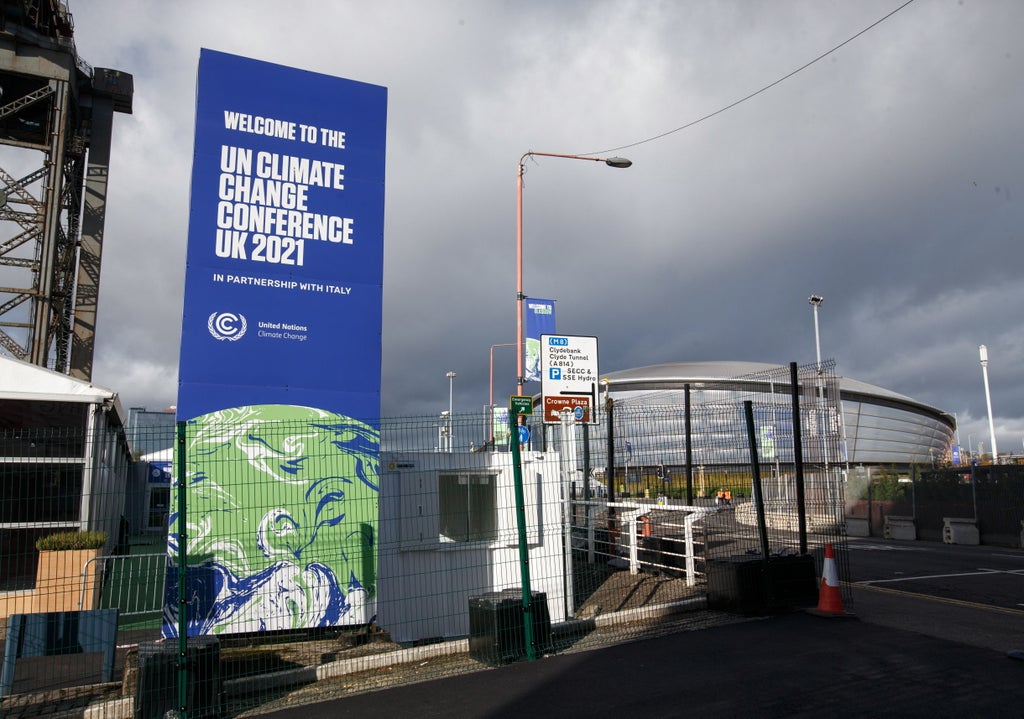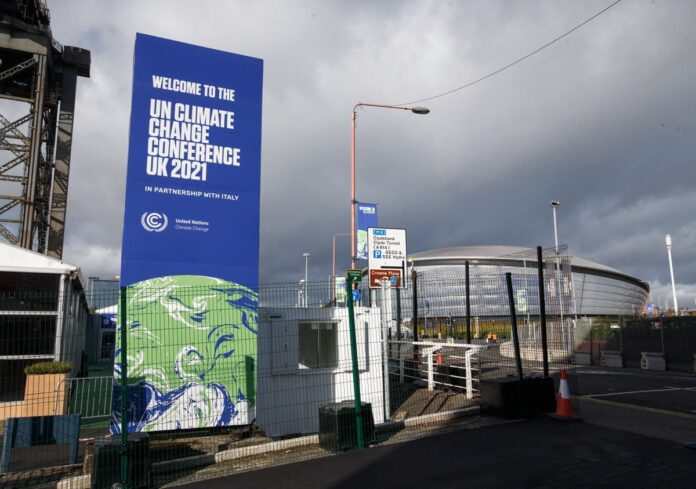[ad_1]

The long-awaited Cop26 summit in Glasgow is now just days away, and with every part of the world facing more climate extremes than at any other time in recorded history, policymakers are under huge pressure to try to negotiate a path that will circumvent the worst that the crisis could bring.
Though the summit is chiefly a venue for political negotiations, the latest advances in climate science provide a bedrock for agreements and discussions.
Ahead of the Glasgow summit, The Independent spoke to some of the world’s leading climate scientists about what must be achieved over the course of the two-week meeting, according to the latest research.
Closing the gap to 1.5C
Cutting global greenhouse gas emissions as fast as possible is the most important step the world must take to tackle the climate crisis.
At Cop21 in 2015, almost all countries pledged to keep warming well below a limit of 2C above pre-industrial levels by 2100, with an aspiration of limiting the temperature rise to 1.5C. A seminal report released in 2018 made it clear that keeping the temperature increase at 1.5C rather than 2C would spare millions from the effects of extreme heat and sea-level rise, and could stop tropical coral reefs from disappearing completely.
But countries’ current climate plans, known as “nationally determined contributions” (NDCs), are not enough to limit global heating to 1.5C.
A recent UN assessment found that countries’ most recent pledges would reduce CO2 emissions by just 7.5 per cent by 2030, when compared to previous commitments. For the world to limit the temperature rise to 1.5C, a cut of 55 per cent would be needed.
Dr Joeri Rogelj, a climate scientist from Imperial College London, who contributed to this report and to many other UN scientific assessments, says Cop26 must provide a “decisive step” forward in countries’ efforts to reduce their emissions.
“Cop26 needs to deliver strengthened NDCs and long-term emissions-reduction strategies by all countries,” he tells The Independent.
“Many countries have already announced their new NDCs, advancing on their earlier targets. But they are still far from sufficient.”
Tougher climate plans from the world’s biggest emitters will be most crucial for getting closer to being on the path to 1.5C, adds Prof Katharine Hayhoe, a climate scientist at Texas Tech University and chief scientist at The Nature Conservancy.
“Several big emitters – the US, Canada, China, South Korea and Japan – have recently announced a goal for when they will be carbon neutral. These commitments have moved us from a likely 3.1C warming down to a 2.7C warming,” she tells The Independent.
“Now other big emitters like Russia, Mexico, and India need to step up. Cop26 will be a success if we leave with commitments that give us at least a 66 per cent chance of remaining below 2C – or better yet, 1.5C.”
Smokestacks at a nickel refinery in Norilsk, Russia, in 2002: the country is one of the world’s major emitters and has been seen as a climate pariah for some years
(Getty)
Cop26 is the first major test of the Paris Agreement’s “ratchet mechanism”. When countries signed the deal in 2015, it was known that the pledges put forward would not be enough to keep the temperature increase below 2C. However, it was agreed that countries would keep “ratcheting” up their ambition by submitting more stringent climate plans every five years.
The Glasgow summit, which was originally due to take place in 2020 but was delayed because of the pandemic, will be an opportunity to see if this mechanism is working.
“Glasgow needs to deliver a big, meaningful crank of the ratchet, with the recognition that we still need more,” says Dr Hayhoe.
However, given the mechanics of the UN climate process, it is unlikely that many major new emissions-reduction pledges will be announced over the course of the conference, Dr Rogelj adds.
“There are limits to what can be achieved on this front during the two weeks of negotiations in Glasgow. Setting NDCs is often accompanied by long-winded domestic processes,” he says.
Learning to live with worse extremes
Another major goal of policymakers should be to recognise that the world is already feeling the effects of the climate crisis, scientists say – and that actions must be taken to adapt to these changes.
A major assessment released in August by the UN’s Intergovernmental Panel on Climate Change (IPCC) concluded that “human-induced climate change is already affecting many weather and climate extremes in every region across the globe”.
“The conclusions of the report show that we are in a climate crisis: the mean global warming recorded in the past decade, 1.1C, is unprecedented in more than 100,000 years,” Prof Sonia Seneviratne, a climate scientist at ETH Zurich and an author of the IPCC report, tells The Independent.
“[Cop26 must] acknowledge that people are now dying of human-induced climate change, even in developed countries, and that the situation will worsen with increasing global warming.”
People rest in ‘cooling shelters’ during this year’s record heatwave in North America, which was worsened by the climate crisis
(AFP/Getty)
Negotiators at the conference must work towards developing more plans to help people adapt to the climate crisis, adds Dr Rogelj.
“Cop26 needs to reflect that climate change is already affecting us, and that many changes are irreversible on timescales of centuries to millennia,” he says.
“The conversation on a global goal on adaptation needs to progress and ensure that the world, including the most vulnerable regions, can prepare and adapt to changes that are already unavoidable today.”
Bringing climate justice
Central to plans to adapt to the climate crisis is a long-held promise for rich nations to provide poorer countries with $100bn a year to help them develop green economies and get to grips with increasing climate impacts.
The promise was first made by rich countries in 2009 with a deadline of 2020 – but this was missed.
“Cop26 must secure the funding arrangements agreed in 2009, and ratified in 2010, for a fund of at least $100bn per annum from the world’s developed economies to support the least-developed countries transition to a low-carbon economy,” says Dr Mark Maslin, a climate scientist at University College London and a member of the UK’s independent Climate Crisis Advisory Group.
“This funding must be a minimum level support to ensure that decarbonisation accelerates development in the least-developed economies, ensuring that Cop26 outcomes align fully with the sustainable development goals.”
The $100bn is central to the issue of climate justice – the recognition that solving the climate crisis must be done in a way that also addresses embedded social inequalities, scientists say.
“Will the wealthy countries who’ve benefitted from fossil fuels contribute what they’ve promised to developing countries who are suffering the worst of the impacts?” says Dr Hayhoe.
However, chances of poorer nations receiving the $100bn a year they have been promised anytime soon look slim. A recent analysis released by the UK’s Cop26 team said that rich countries were on track to meet the funding target by 2023, three years late.
The Glasgow summit can also address the climate justice issue by ensuring a wide range of voices, including those from the most marginalised communities, are given a seat at the table during the negotiations, says Prof Dave Reay, executive director of the Edinburgh Climate Change Institute at the University of Edinburgh.
“We need the voice of community, culture, and arts and humanities more strongly than ever,” he adds.
Protecting wild spaces
A growing body of scientific evidence shows that the climate crisis and catastrophic nature loss are inextricably linked – and that efforts to tackle either challenge must incorporate the other if they are to be successful.
Key to addressing both crises are ending deforestation, protecting the world’s remaining wild spaces, and restoring lost habitats.
“In addition to reducing our carbon emissions, akin to turning off the hose into an overflowing swimming pool, and learning how to swim (adapting to higher levels of water in the pool, or CO2 in the atmosphere), we also need to make the drain bigger,” explains Dr Hayhoe.
“Increasing natural carbon sinks through nature-based climate solutions has the potential to provide as much as 37 per cent of the mitigation required for 2030 goals.
“Major commitments are needed from governments and the private sector to fund and implement nature-based climate solutions, including forest conservation.”
Livestock farming is a key driver of the climate crisis and nature loss
(AFP/Getty)
Changes to agricultural practices, especially livestock farming, will be key to achieving these aims, adds Dr Maslin.
“Nature stores more carbon than we currently burn, and these critical environmental services must be secured and enhanced,” he says.
“In particular, the focus should be on avoiding deforestation and promoting appropriate reforestation and rewilding. In terms of agriculture, we need to adopt sustainable farming practices, limit livestock production, restore and strengthen the carbon-sink capacity of farmland and topsoil all around the world.”
Finalising the Paris rulebook
As well as being the first test of Paris’s ratchet mechanism, Cop26 will also provide the stage for finalising the remaining sticking points in the Paris Agreement’s rulebook, which addresses questions around how countries should formulate their climate plans.
An obscure and highly technical section of the rulebook, known as Article 6, is the last major puzzle piece to be resolved. It covers rules for carbon markets and other types of international cooperation.
“Cop26 still needs to deliver some of the nuts and bolts that are critical to ensure the environmental integrity and robustness of the Paris architecture,” says Dr Rogelj.
“These include a solid decision on markets that eliminates double counting, and key decisions on how future NDCs are presented.”
Negotiators failed to agree on the rules for Article 6 at the last UN climate conference in Madrid in 2019. With different countries taking different positions on how the matter should be resolved, it will not be easy for negotiators to resolve the matter in Glasgow.
“Getting the rulebook done – some of that more geeky stuff is really important,” adds Prof Reay.
“That rulebook won’t get many headlines but it is important. Negotiators will spend a lot of time on it.”
[ad_2]
Source link













